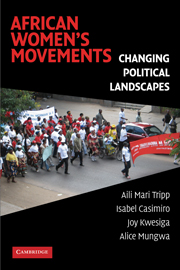Book contents
- Frontmatter
- Contents
- List of Tables
- Acronyms
- Preface
- 1 Introduction
- 2 Historic Influences on Contemporary Women's Movements
- 3 The Rise of the New Women's Movements
- 4 The Challenge of New Women's Movements
- 5 Women's Movements and Constitutional and Legislative Challenges
- 6 In Pursuit of Equal Political Representation
- 7 Engendering the State Bureaucracy
- 8 Women's Movements Negotiating Peace
- 9 African Women's Movements and the World
- Bibliography
- Index
9 - African Women's Movements and the World
Published online by Cambridge University Press: 10 January 2011
- Frontmatter
- Contents
- List of Tables
- Acronyms
- Preface
- 1 Introduction
- 2 Historic Influences on Contemporary Women's Movements
- 3 The Rise of the New Women's Movements
- 4 The Challenge of New Women's Movements
- 5 Women's Movements and Constitutional and Legislative Challenges
- 6 In Pursuit of Equal Political Representation
- 7 Engendering the State Bureaucracy
- 8 Women's Movements Negotiating Peace
- 9 African Women's Movements and the World
- Bibliography
- Index
Summary
This book is about a social transformation that is revolutionizing women's status in African societies in ways that it would have been hard to imagine even a couple decades ago. For those involved in the movements, it still seems like there is a long way to go and the hurdles ahead are daunting. However, if one takes a step back to examine the overall crossnational picture in Africa, the patterns of change are unmistakable and there is no question that there have already been significant changes in gender-related norms, government objectives, and, to a more modest extent, in the advancement of the status of women.
The cases of Cameroon, Mozambique, and Uganda in many ways typify some of the key trends that we see today in Africa, both in women's status as well as in the persistence of the status quo. Each case points to both possibilities as well as the limitations of these changes.
Women's movements were critical to the legislative and constitutional changes related to women's rights, facilitating gender mainstreaming in the state bureaucracy, carving out new roles for women in postconflict contexts, and promoting expanded political leadership roles for women at all levels. But women's movements were not alone in their efforts to bring about radical changes. They took advantage of opportunities that had converged at the international and regional levels as well as trends within Africa, such as the end of major civil conflicts.
- Type
- Chapter
- Information
- African Women's MovementsTransforming Political Landscapes, pp. 217 - 230Publisher: Cambridge University PressPrint publication year: 2008



